On November 15, Texas State Representative Ryan Guillen of Rio Grande City in Hispanic-dominated South Texas announced his switch to the Republican Party for his upcoming re-election bid.
Texas Democrats immediately tried to make the case that Guillen is leaving the Democratic Party because his newly drawn district lines would make it tough for him to gain re-election as a Democrat, but that is a reality that doesn’t fit the facts as much as it fits Democrat excuse-making and fantasy.
Yes, the new lines of House District 31 make it more Republican-friendly, but even though Donald Trump won it by 13 percentage points four years after Hillary Clinton carried it by the same margin, Guillen won re-election last year by 17 points (a point well made by Patrick Svitek of the The Texas Tribune). Nearby state Rep. J.M. Lozano of Kingsville made the switch in 2012, almost a decade ago.
Guillen is a Democrat who refused to illegally flee the Capitol to D.C. this year, voted for constitutional carry of handguns, voted for the Texas [fetal] Heartbeat Act, and was the only House Democrat to vote to protect girls’ sports from boys who claim to be girls, crashing their competitions.
Guillen is not a political conservative and neither is Lozano, but they both do seem able to see the reality of how far the Texas Democratic Party has moved from the values of many of the people they, the state representatives, represent. In that sense, the party switch can be said to be a move to ensure re-election; but then again, that is what all party identity is generally about.
A former Rio Grande Valley state representative, Aaron Peña, switched to the GOP in 2010 and said the “liberal Austin elites and their acolytes in the party structure were extremely hostile” but that his community didn’t bat an eye, according to an interview with The Texan.
In a report from Texas Public Radio on the same day of Guillen’s party switch, we get an example of how the values reality in the Rio Grande Valley is different from the alternate universe of leftist Democrats there. The report comes from a story about the announced retirement of longtime State Senator Eddie Lucio Jr. of Brownsville, which was headlined: Progressives hope State Sen. Eddie Lucio Jr.’s retirement signals new era.
Dr. Mònica Clua, a political science professor at the University of Texas Rio Grande Valley, said Lucio’s support of liquified natural gas (LNG) facilities and SpaceX’s Boca Chica site are notable examples of his straying from the party line and his constituents.
“Those have been projects that have brought a lot of risk to the community and very few guaranteed gains,” she said.
Professor Clua asserts that supporting natural gas terminals for export at the Port of Brownsville and SpaceX’s launch facility, the biggest development in decades for Cameron County, are things opposed by Senator Lucio’s constituents across the area.
What is Clua’s evidence for this claim?
Local media reports show overwhelming support for SpaceX, if we judge by FAA public hearings and local political cooperation as metrics of support. But Clua is comfortable simply asserting that Lucio’s “constituents” are mostly opposed to such because I assert that she, like so many others on the left, live in an alternate universe that ignores the plain reality that most people value good, authentic jobs and improving living standards more than empty socialist promises—especially when they experience the reality of those jobs and the economic spinoff those promises create, as is being experienced the Valley.
Clua and many other leftists live in a universe so far from reality that even SpaceX’s Starliner will never be able to make the jump, and no litany of ill-founded assertions will change that. Politicians seeking actual votes to remain in office are subjected to a reality check each voting cycle that university profs and paid activist group “volunteers” avoid when living in their echo-chamber alternate universe.
This is a commentary published with the author’s permission. If you wish to submit a commentary to Texas Scorecard, please submit your article to submission@texasscorecard.com.





